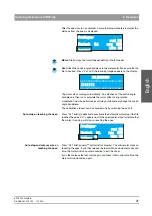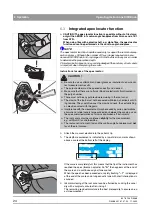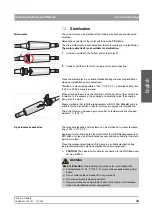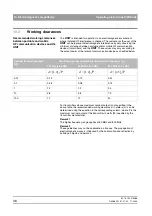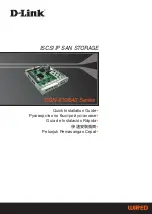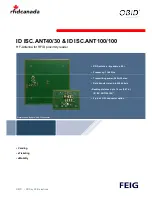
60 78 104 D 3488
D 3488.201.01.07.02
11.2009
29
Operating Instructions SIROEndo
7 Care and cleaning
båÖäáëÜ
7.3
Sterilization
Micromotor
The micromotor can be sterilized if the following instructions are observed
carefully:
Detach the connector of the motor cable from the SIROEndo.
The micromotor must be uncoupled from the motor cable prior to sterilization.
The motor cable itself is not suitable for sterilization.
1.
Unscrew and detach the bottom part of the motor
C
.
2.
Carefully pull the motor off of its plug-and-socket connection.
Place the micromotor in a suitable sterilization bag (see recommendations
made by sterilization unit manufacturer).
Sterilize at a steam temperature of 134 °C (273.2 °F),
3 minutes holding time
(2.04 bar; 29.59 psi overpressure).
When attaching the motor to the coupling, note the position of the contact pins
in relation to the sockets in the coupling
and carefully screw the coupling
firmly onto the motor.
Steam sterilizers that fulfill the requirements of EN 13060,
Class B
and are
suitable for the sterilization of dental motors are approved for sterilization.
The micromotor can be used again only after its temperature has dropped
below 40 °C (104 °F).
Apex locator accessories
The mucosal electrode and file clamp can be sterilized at a steam
tempera-
ture of 134 °C (273.2 °F).
Approved for sterilization are steam sterilizers that fulfill the requirements of
EN 13060 or at least use fractionated vacuum and are suitable for the steril-
ization of motors
.
Place the mucosal electrode and file clamp in a suitable sterilization bag
(see recommendations made by sterilization unit manufacturer).
¾
CAUTION:
The apex locator cable for connection to the SIROEndo can-
not be sterilized.
C
WARNING
Risk of infection
if the following instructions are not complied with.
¾
A temperature of 134 °C (273.2 °F) must not be exceeded during steril-
ization.
¾
Do not immerse the components in any solutions.
¾
Do not use ultrasonic cleaning systems!
¾
Proper maintenance and periodic checks of the function and tempera-
ture of the sterilization system are important.







